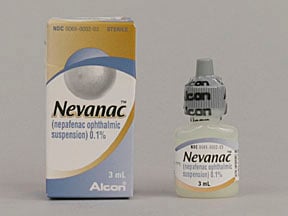
Nevanac Coupons & Savings Card – Discount Prices from $211.05
My prescription
Edit
3ML of 0.1%, Nevanac (1 Bottle)
Select pharmacy

CVS
$348.65
COUPON PRICE
Albertsons
$211.05
COUPON PRICE
Walmart
$322.63
COUPON PRICE
Walgreens
$333.62
COUPON PRICENevanac savings card
Show this card to your pharmacist
Albertsons
$211.05
BIN
ID
PCN
GRP
019876
LHF77AC18F
CHIPPO
LHX
Powered by
Related NSAIDs prescriptions
More prescriptions for eye pain
Related NSAIDs prescriptions
More prescriptions for eye pain
Price history for Nevanac
1 Bottle, 3ML of 0.1%
Average retail price for Nevanac
Average SaveHealth price for Nevanac
Our price history data is based on aggregated prescription data collected from participating pharmacies in America. Our prescription data updates daily to reflect the latest price changes. If you notice a missing data point, it means there wasn't sufficient data available to generate a monetary value for that date.
*Retail prices are based on pharmacy claims data, and may not be accurate when we don't have enough claims.
Nevanac dosage forms
Dosage Quantity Price from Per unit 3ML of 0.1% 1 Bottle $211.05 $211.05 3ML of 0.1% 2 Bottles $414.61 $207.31 3ML of 0.1% 3 Bottles $618.16 $206.05
| Dosage | Quantity | Price from | Per unit |
|---|---|---|---|
| 3ML of 0.1% | 1 Bottle | $211.05 | $211.05 |
| 3ML of 0.1% | 2 Bottles | $414.61 | $207.31 |
| 3ML of 0.1% | 3 Bottles | $618.16 | $206.05 |
What is the drug Nevanac used for?
Nevanac is used to treat pain and inflammation associated with cataract surgery. It is an ophthalmic non-steroidal anti-inflammatory drug (NSAID) that helps reduce swelling in the eye.
What is equivalent to nevanac?
An equivalent to Nevanac (nepafenac ophthalmic suspension) would be other nonsteroidal anti-inflammatory drugs (NSAIDs) used in ophthalmology, such as ketorolac ophthalmic solution. However, it is important for patients to consult with their healthcare provider to determine the most appropriate medication for their specific condition.
Can you drink alcohol while taking NEVANAC eye drops?
There are no known interactions between NEVANAC (nepafenac ophthalmic suspension) eye drops and alcohol. However, it is always advisable to consult with a healthcare provider for personalized advice, as individual health conditions and medications may vary.
What is an alternative to Nevanac?
An alternative to Nevanac (nepafenac) could be other non-steroidal anti-inflammatory drugs (NSAIDs) used in ophthalmology, such as ketorolac ophthalmic solution or bromfenac ophthalmic solution. It is important for the patient to consult with their healthcare provider to determine the most appropriate alternative based on their specific condition and medical history.
Does NEVANAC have steroids in it?
NEVANAC does not contain steroids. It is a non-steroidal anti-inflammatory drug (NSAID) used to treat pain and inflammation in the eyes.
